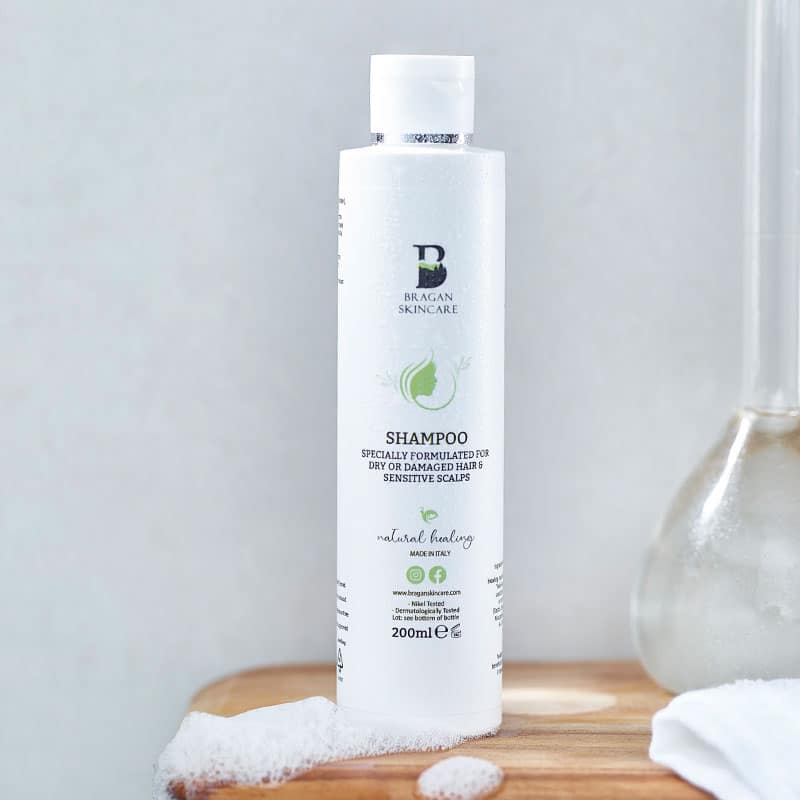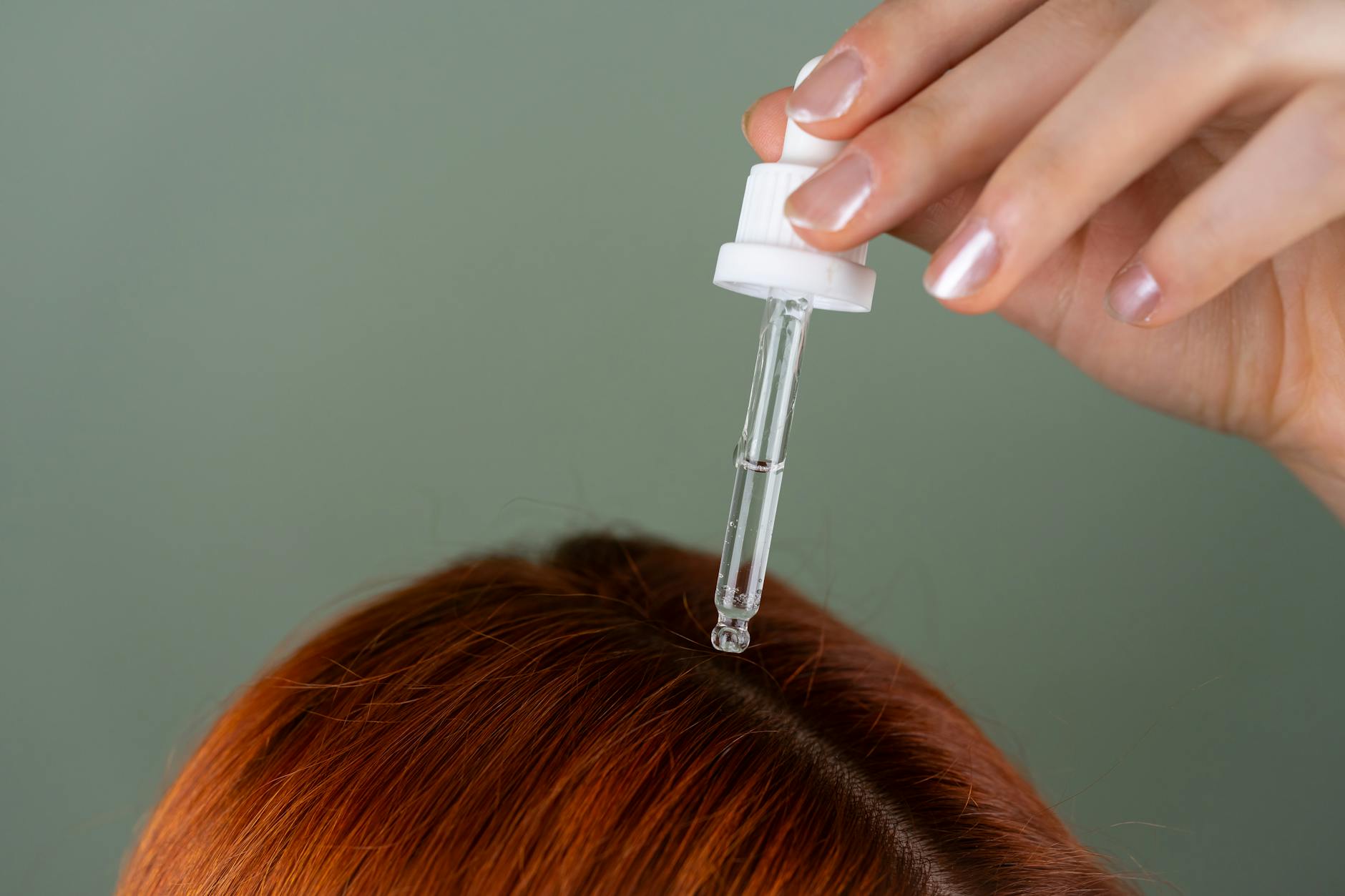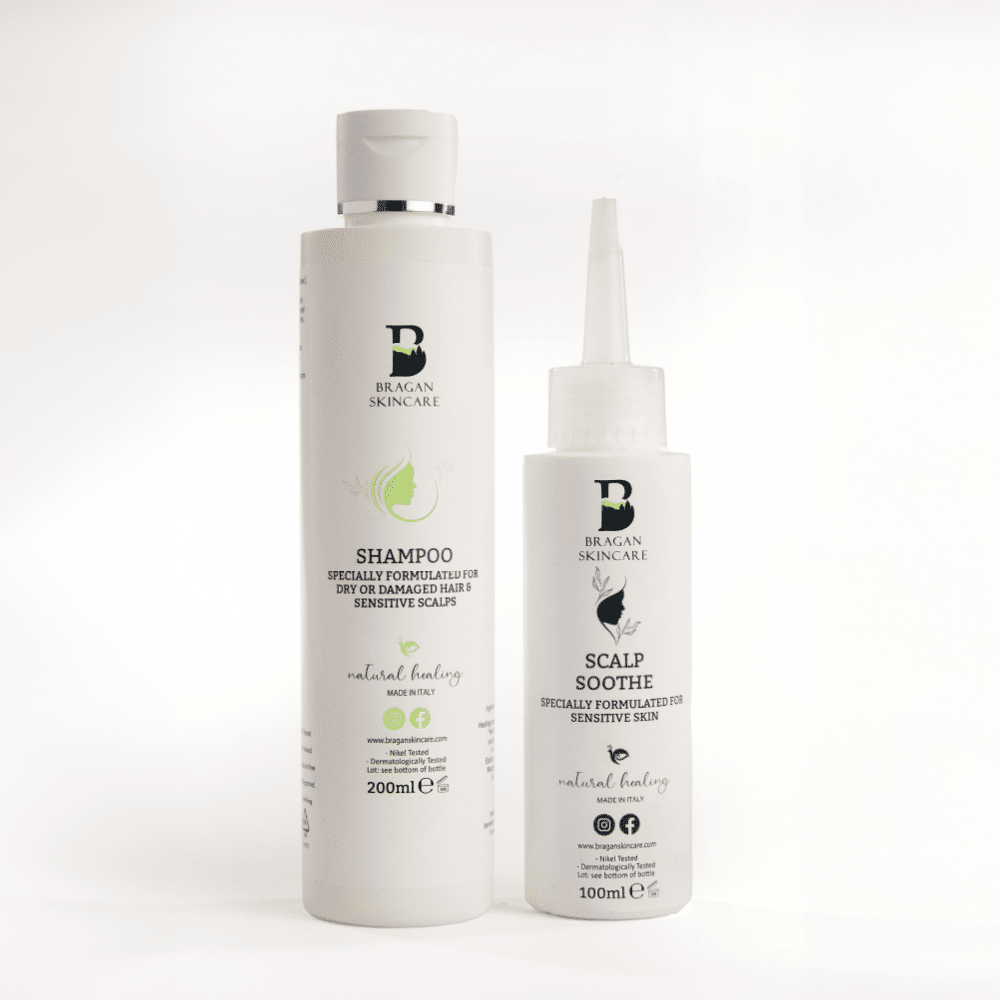How to Choose the Best Shampoo for a Dry, Itchy Scalp
Shampoo for a Dry Itchy Scalp: Choosing the right shampoo for a dry, itchy scalp can feel overwhelming. With so many options, it’s crucial to find one that truly works. Dryness and itchiness often stem from irritated skin, so selecting a gentle formula tailored to your scalp’s needs is key. At Bragan Skincare, we focus on natural solutions like snail mucin to soothe and heal sensitive scalps. Known for its history in treating various skin conditions, snail mucin contains powerful components, including glycolic acid and allantoin, which nourish and repair skin. Discover more about effective scalp care here.

Understanding Dry, Itchy Scalps
A dry, itchy scalp is more than just an annoyance—it’s a signal from your skin that something isn’t quite right. Before choosing the perfect shampoo, it’s important to understand the root causes and symptoms of this condition. Armed with this knowledge, you can take steps to restore your scalp’s health.
Causes of Dry Scalp
Dry, itchy scalps don’t just happen overnight. A combination of external and internal factors often contributes to this issue. Here are the most common causes:
- Weather Changes: Cold, dry air can sap moisture from your skin, including your scalp. This makes flakiness and discomfort more common during the winter months.
- Skin Conditions: Problems such as eczema, psoriasis, or seborrheic dermatitis often lead to dryness and irritation.
- Harsh Products: Many hair care products contain strong chemicals that strip natural oils. These oils protect and hydrate the scalp, and losing them can result in dryness.
- Frequent Washing: Over-washing your hair can wash away natural oils, leaving your scalp dry.
- Poor Diet: A lack of essential nutrients, especially Omega-3 fatty acids or zinc, might also be a contributing factor.
For more detailed information on managing dryness caused by these factors, the Cleveland Clinic offers an insightful overview.
Symptoms of Dry Scalp
Recognising the signs of dry scalp early can help you take action before the condition worsens. Here are the tell-tale symptoms to watch out for:
- Persistent Itchiness: An itchy scalp is a key indicator that your skin is lacking moisture.
- Flaking Skin: Dryness often causes the scalp’s outer layer to shed, leading to visible flakes.
- Redness and Irritation: Sensitive skin might turn red and feel tender to touch.
- Tightness: Your scalp might feel tight, as if it’s being stretched.
- Sensitivity: Increased sensitivity to hair products or temperature changes could also point to a dry scalp.
If you’re struggling with severe itching or flakes, it may be worth considering whether your scalp condition needs specialised care. For relief tips tailored to dry and itchy scalp concerns, the American Academy of Dermatology Association provides in-depth advice here.

By understanding the causes and symptoms of a dry scalp, you’ll be better prepared to choose the right care, such as tailoring your choice of shampoo to meet these needs. If you’re ready to take the next step, explore natural solutions like Bragan Skincare’s Shampoo for sensitive scalps for hydration and relief. The unique benefits of snail mucin in this product can help repair and nourish your scalp like few other natural ingredients can. Learn more about our approach here.
Choosing the Right Shampoo for a Dry, Itchy Scalp
Finding the perfect shampoo for a dry, itchy scalp is an essential step to achieving scalp health. Using the wrong shampoo can exacerbate dryness and irritation, as not all shampoos are equal. To make an informed choice, focus on the ingredients and how they can help—or harm—your scalp.
Ingredients to Look For
When shopping for a shampoo, look for hydrating and soothing ingredients. These components help restore moisture, ease itchiness, and protect your scalp. Below are some key ingredients to consider:
- Snail Mucin: Known for its deeply hydrating properties, it contains glycolic acid and allantoin that repair and nourish the scalp. It’s been used for centuries to address various skin conditions and promote healing. Curious about the benefits of snail mucin? Learn how it can transform your scalp here.
- Aloe Vera: A natural moisturiser that soothes irritation and helps retain hydration.
- Tea Tree Oil: Known for its antibacterial and antifungal properties, tea tree oil effectively combats irritation caused by dandruff or fungal growth.
- Jojoba Oil: This lightweight oil mimics the skin’s natural sebum, making it excellent for reducing dryness without clogging pores.
Choosing a product that includes these nourishing ingredients will ensure your scalp gets the care it deserves.
Ingredients to Avoid
Just as there are beneficial ingredients, some components can exacerbate dryness or cause further damage. Be cautious of the following:
- Sulphates: These harsh chemicals strip away the natural oils your scalp needs for hydration.
- Alcohols: Certain alcohols, such as ethanol or isopropanol, can leave your scalp dried out and irritated.
- Synthetic Fragrances: While they may smell lovely, fragrances can often cause sensitivities or allergic reactions.
- Parabens: These preservatives can disrupt your scalp’s natural balance, leading to long-term damage.
Avoiding these harmful ingredients will keep your scalp from becoming even more irritated.
Testing New Shampoos
You don’t have to take a risk when trying a new product. You can test shampoos safely by taking a cautious, step-by-step approach:
- Patch Test First: Apply a small amount of shampoo to a small area of your scalp or behind your ear. Check for reactions after 24-48 hours.
- Use on Clean Hair: Rinse or wash your hair with a neutral product before testing the new shampoo to observe its effects clearly.
- Monitor Results: Use the new shampoo for a week and note if dryness, itchiness, or irritation improves or worsens.
For even more insights on choosing shampoos designed for dry scalps, take a look at expert recommendations in resources like Cosmopolitan’s guide on the best options for dry scalps.
Taking care when choosing and trialling a shampoo will help you find the best match for your skin’s needs. Check out Bragan Skincare’s shampoos crafted with natural ingredients to target dryness with effective solutions. If you’re ready to soothe your scalp, our products enriched with snail mucin are a great place to start.
The Benefits of Snail Mucin
Snail mucin, a naturally occurring secretion from snails, has gained recognition for its remarkable benefits in skincare. While it’s often featured in skincare products, its advantages extend to treating scalp issues, including dryness and itchiness. Let’s explore its history, components, and how Bragan Skincare integrates this powerful ingredient into its products to soothe and restore scalp health.
Historical Use of Snail Mucin
For centuries, snail mucin has been a go-to remedy for various skin conditions. Ancient civilisations, including the Greeks and Egyptians, used snail secretion for its supposed healing properties. Farmers in South America noticed that working with snails left their hands surprisingly soft and free of irritation, leading to the inclusion of snail mucin in modern skincare. Today, it’s celebrated globally for treating everything from acne to dryness and inflammation.

Components of Snail Mucin
Snail mucin is packed with key components that make it effective for nourishing and healing skin. Here’s a closer look at the essential ingredients:
- Glycolic Acid: Promotes gentle exfoliation, enabling the removal of dead skin cells. This gives the scalp a clearer, healthier surface.
- Allantoin: Known for its soothing properties, allantoin helps reduce irritation and promote cell regeneration.
- Elastin and Collagen: These natural proteins work to improve elasticity and strengthen the skin barrier, making your scalp more resilient.
- Hyaluronic Acid: An intense hydrator that locks in moisture, keeping your scalp hydrated for longer periods.
- Antioxidants: These protect the skin from environmental stressors, reducing inflammation and aiding in overall scalp health.
This unique blend of components sets snail mucin apart as an effective remedy for scalp irritation, dryness, and other skin issues.
Promoting Bragan Skincare’s Products
Bragan Skincare’s Shampoo for Sensitive Scalps transforms your dry, itchy scalp. Enriched with snail mucin, it delivers a perfect blend of hydration and healing. This shampoo not only soothes but also repairs the scalp, giving you relief from itchiness and flakiness.
For those needing an extra layer of care, the Bragan Skincare Scalp Soothe product also utilises the power of snail mucin. Its lightweight formula nourishes the scalp, promoting long-term skin health. Both products are crafted with natural ingredients to ensure effectiveness without the harshness of chemicals.
Discover more about these products and how they can enhance your scalp’s health by visiting our dedicated scalp care page.
For additional insights into snail mucin’s benefits, check out Snail Mucin for Skincare from Mayo Clinic or explore its uses via WebMD’s detailed guide.
By combining ancient wisdom with modern science, snail mucin stands out as a natural and effective solution for scalp care.
Tips for Managing a Dry, Itchy Scalp
Taking steps to manage a dry, itchy scalp starts with understanding the root causes and making thoughtful adjustments to your routine. These changes not only help reduce discomfort but also promote long-term scalp health.
Regular Scalp Care Routine
Consistency is key when it comes to caring for your scalp. Establishing a routine that nourishes and protects the skin can significantly improve its condition. Here’s a simple yet effective guide to follow:
- Shampoo Wisely: Use a gentle, moisturising shampoo designed for sensitive scalps. Avoid products with harsh sulphates that strip moisture. Bragan Skincare offers excellent options, including their Sensitive Scalp Shampoo, enriched with snail mucin, which helps hydrate and heal the skin.
- Condition Regularly: After shampooing, apply a conditioner that complements your scalp’s needs. This helps restore moisture and prevent dryness.
- Don’t Overwash: Washing hair too frequently can worsen dryness by stripping away natural oils. Aim for two to three washes per week.
- Massage Your Scalp: While shampooing, massage the scalp for a few minutes. This improves blood flow and assists with product absorption.
For additional self-care tips tailored to dry scalp conditions, the American Academy of Dermatology provides useful insights.
Lifestyle Adjustments
Your daily habits play a crucial role in maintaining scalp health. Simple lifestyle changes can go a long way in reducing dryness and itchiness.
- Drink More Water: Staying hydrated is essential for overall skin health, including your scalp. Aim for at least 8 glasses of water daily.
- Improve Your Diet: Include foods rich in Omega-3 fatty acids, zinc, and Vitamin E. These nutrients nourish the skin from within.
- Manage Stress: High stress levels can trigger scalp conditions. Practice stress management with techniques like meditation or light exercise.
- Quit Smoking: Smoking reduces blood flow to the scalp, which can worsen dryness.
- Avoid Harsh Weather: Protect your scalp during extreme weather conditions by wearing a hat in the cold or using sunscreen in the heat.
Natural remedies, such as coconut oil or apple cider vinegar, can also provide relief for dry scalps. Learn more about at-home solutions here.
By following these practical tips, you can significantly reduce itchiness and discomfort while improving overall scalp health. Don’t forget to explore Bragan Skincare’s specialised products to give your scalp the care it truly deserves.
Conclusion: Shampoo for a Dry Itchy Scalp
Choosing the best shampoo for a dry, itchy scalp requires knowledge and care. By understanding your scalp’s needs and focusing on hydrating, soothing ingredients, you can alleviate discomfort and improve skin health.
Embrace natural solutions like Bragan Skincare’s products, crafted with snail mucin to deeply nourish your scalp. With centuries of use in skincare, snail mucin combines hydration, repair, and protection, offering a holistic remedy for dryness.
Give your scalp the relief it deserves. Visit our dedicated page and explore effective treatments tailored to restore scalp health.
Shampoo & Scalp Soothe Bundle
Bragan Skincare Shampoo and Scalp Care Bundle At Bragan Skincare, we believe that healthy, beautiful hair starts with a balanced, nourished scalp. That’s why we’ve crafted the Shampoo and Scalp Care Bundle—a powerful combination of our Sensitive Scalp Shampoo and Sensitive Scalp Soothe treatment, designed to work in harmony for the ultimate scalp and hair care experience. Perfect for those suffering with Eczema, Psoriasis. Dermatitis and many other skin condition. Why snail mucin? Because it works. Both products in this bundle are powered by the exceptional healing properties of snail mucin. Packed with allantoin, glycolic acid, and peptides, snail mucin…
Featured Bragan Skincare Products
-
€39.99 – €100.00Price range: €39.99 through €100.00Select options This product has multiple variants. The options may be chosen on the product page
-
€100.00Select options This product has multiple variants. The options may be chosen on the product page

